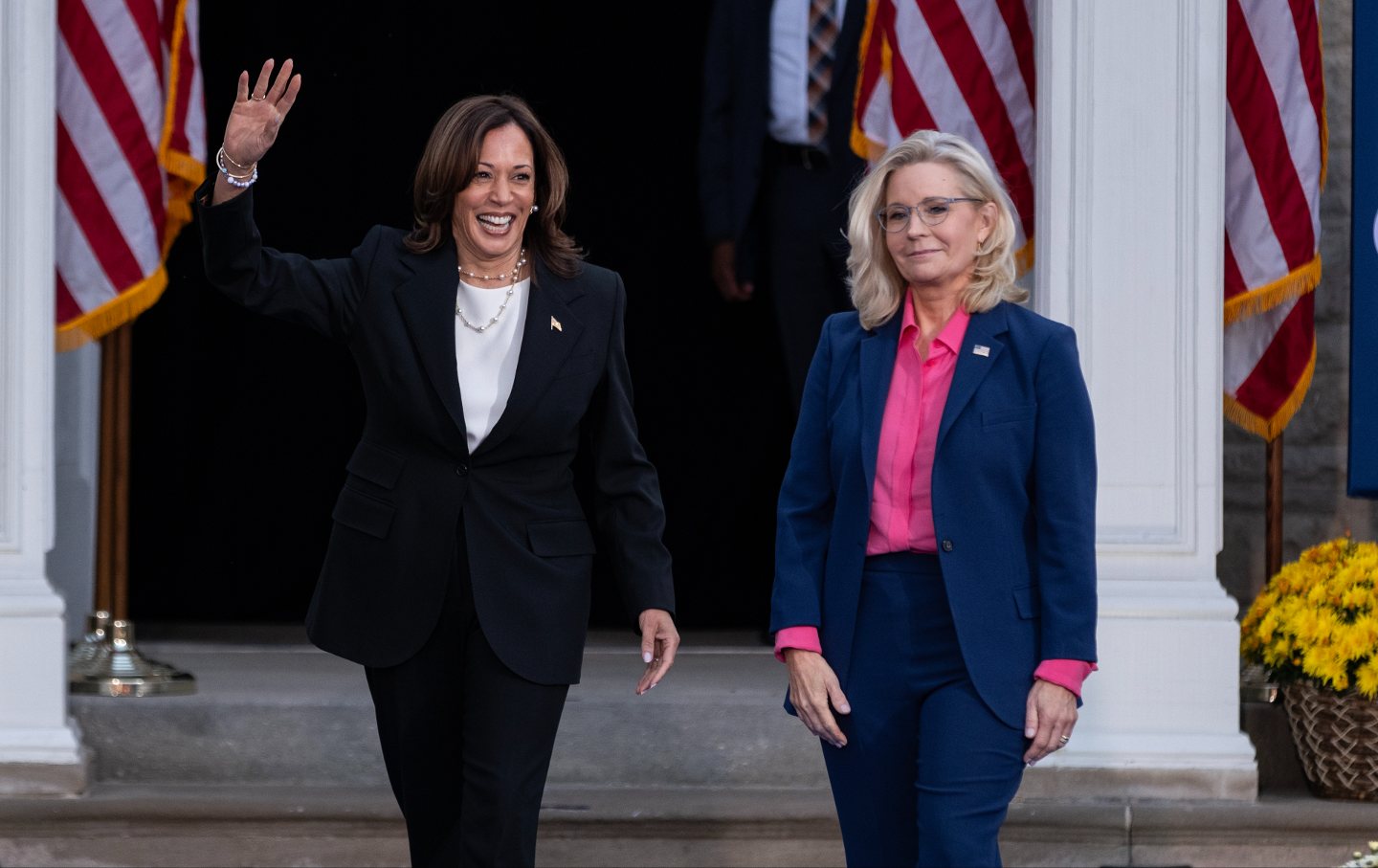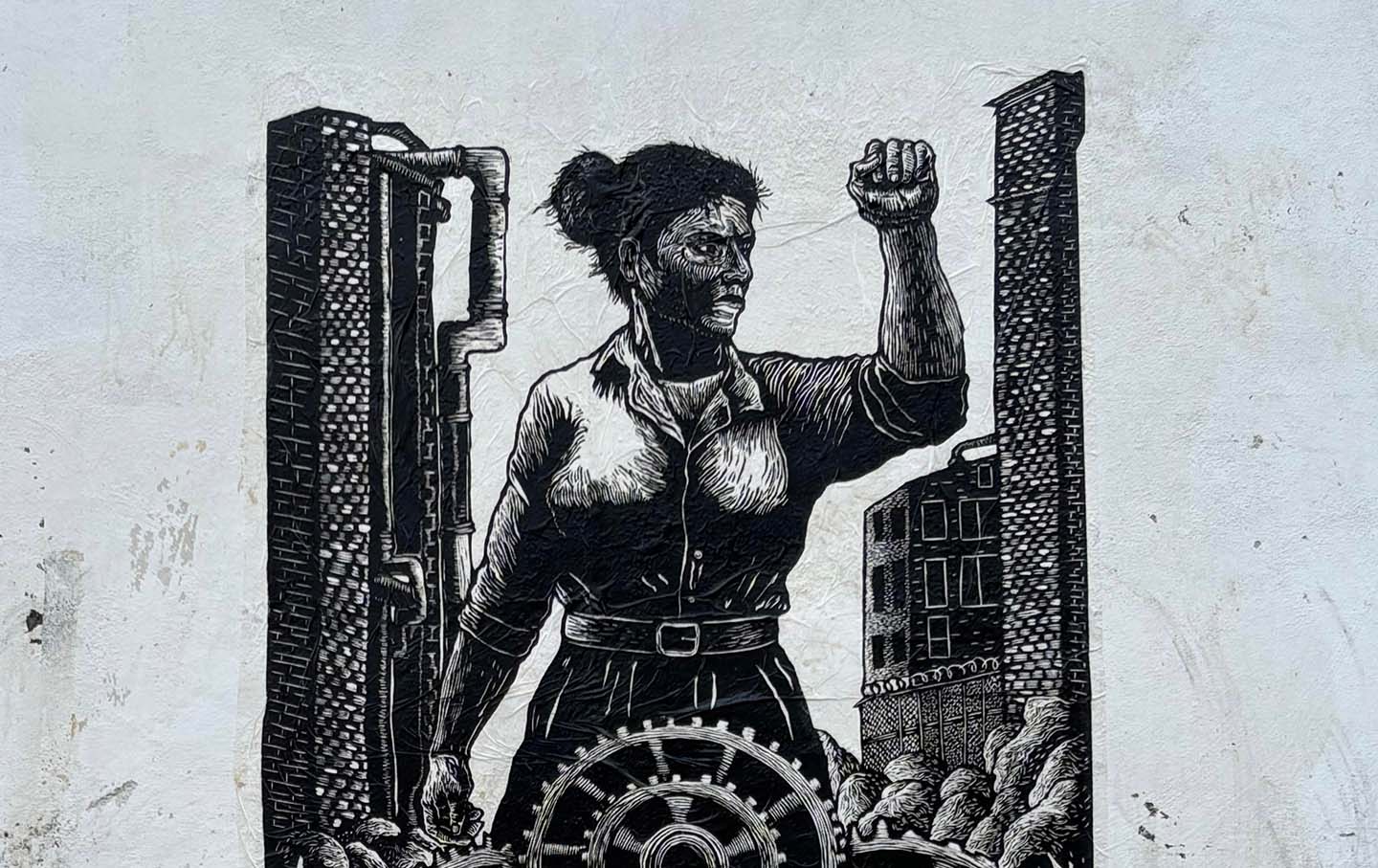Kamala Harris—Not Liz Cheney—Is Calling Republicans Back to Their Party’s Roots
The Republican Party was not founded as a vehicle for Trumpism or Cheneyism. It was a radical party that championed economic and social and racial justice.

Kamala Harris walks out with former US representative Liz Cheney during a rally at Ripon College on October 3, 2024, in Ripon, Wisconsin.
(Jim Vondruska / Getty Images)The great error that much of the media made with its coverage last week of the visit by Kamala Harris and Liz Cheney to the Wisconsin birthplace of the Republican Party came in the form of a suggestion that Cheney, the possessor of one of the most prominent names in contemporary Republican politics, was providing Harris, the Democratic nominee for president, with a connection to the historical roots and values of the Grand Old Party.
In fact, it was the other way around.
Cheney, a former Republican congressional leader, has a history of adopting extreme right-wing stances on matters of war and peace, corporate power, labor rights, immigration, and a host of other issues that would have been anathema to the people who founded the Republican Party. She is, as well, the daughter of a former Republican vice president, Dick Cheney, who dragged the party into the neoconservative camp and made its name synonymous with tax cuts for the rich and subservience to corporations.
It is Harris—the daughter of immigrants who is running on proposals to strengthen the ability of the federal government to tackle price gouging by monopolies, tax the rich, improve the circumstances of the working class, and advance the cause of economic, social and racial justice—who would be far more likely to arouse the enthusiasm of the people who launched the Republican Party from a schoolhouse in the eastern Wisconsin college town of Ripon.
Though she may not be so left-wing as the Ripon Republicans of 1854, Harris has views that are reasonably in sync with the first candidate they elected to the presidency. Republican Abraham Lincoln decried the “monstrous injustice of slavery” at a time when most Southerners and many Northerners accepted the original sin of the American experiment; he supported sweeping land reforms; he sided with immigrant workers; and he engaged in militant advocacy for the working class. “Labor is prior to and independent of capital,” Lincoln announced in his first annual address to the nation, in 1861. “Capital is only the fruit of labor, and could never have existed if labor had not first existed. Labor is the superior of capital, and deserves much the higher consideration.”
That’s a line often quoted by labor unions that now are among Harris’s most ardent supporters—and that for decades have opposed the anti-union policies of the Cheneys and their corporate allies. But politics makes for strange alliances. So it is that Cheney, the former Republican congressional leader who in 2021 broke with her party’s president after he sought to overturn the results of the 2020 presidential election, has emerged as Harris’s most prominent Republican backer.
Harris and Cheney came to Ripon with the purpose of encouraging more Republicans to join the former representative from Wyoming in backing the Democratic nominee’s presidential bid. It’s a politically significant endeavor at a point when Harris is locked in a competitive presidential race with former president Donald Trump, the authoritarian extremist who has spent the better party of a decade working to turn the GOP into a cult of personality.
Despite the former president’s tightening grip on the party machinery, millions of party members reject what Cheney on Thursday described as Trump’s “depraved cruelty.” Former United Nations ambassador Nikki Haley won 4.3 million votes for her primary challenge to Trump—earning substantial support in Wisconsin, Michigan, Arizona, and other closely contested battleground states. Though Haley is now a grudging Trump backer, her supporters have organized a well-funded Haley Voters for Harris campaign that is actively seeking to move disenchanted Republicans toward Harris.
Cheney appeared with Harris at a packed rally where banners declared, “Country Over Party,” and where the former representative from Wyoming told wavering Republicans, “In this election, putting patriotism ahead of partisanship is not an aspiration. It is our duty.”
Trump’s response to this threat has been to label Harris as “a radical left person.” Like most contemporary Republicans—along with a lot of Democrats and members of the media—Trump imagines that the Republican Party has always been conservative. But that’s a political fallacy.
What Trump fails to recognize is that the “radical left” label better describes the politics of the founders of the Republican Party than the “conservative” label that Ronald Reagan, Dick Cheney, Liz Cheney, and their kind so successfully attached to the party during the time that it was their fiefdom.
The first Republicans were true radicals—people who sought to upend the politics of the country at a time when the existing parties were capitulating to the demands of Southern slaveholders and their political patrons.
If you visit the Little White Schoolhouse in Ripon, which is emblazoned with the words “Birthplace of the Republican Party,” you will be introduced to the story of how Alvan Earle Bovay “called a meeting of 53 voters…to form a new party.” The historical record tell us that the meeting was organized “to protest the Senate’s passage of the Kansas-Nebraska Act, which permitted the extension of slavery beyond the limits of the Missouri Compromise. The protest resulted in the formation of a new, albeit local party, drawn from the ranks of disgruntled Whigs, Free Soilers, and Democrats.”
Popular
“swipe left below to view more authors”Swipe →Among the petitioners were a number of people like Jacob Woodruff, who moved to the Ripon area as a member of the Wisconsin Phalanx. And Hiram S. Town, another member of the Phalanx. And Robert Mason, another member of the Phalanx. And William Dunham, an incorporator of the Phalanx, who served as a moderator of the first of the meetings that gave rise to the Republican Party.
The Advisory Council on Historic Preservation, an independent federal agency that advises the president and Congress on national historic preservation policy, describes the Wisconsin Phalanx as “an experimental socialist community” founded by followers of Charles Fourier, the French philosopher who was one of the founders of utopian socialism. Fourier’s ideas were popularized in the United States by Horace Greeley’s New York Tribune, which for a number of years employed Karl Marx as its European correspondent.
Bovay, a friend and associate of Greeley, had moved to Ripon a few years before he called the 1854 meeting. A veteran organizer who had led militant movements for land reform—with the slogan, “Vote Yourself a Farm”—Bovay had long advocated for the formation of an independent political movement with the purpose of gaining control of legislatures and the Congress in order to enact radical reforms.
At Bovay’s urging, Greeley popularized the new party, which united partisans from many political camps in common opposition to the spread of slavery. Among the first Republicans were many allies and associates of socialist causes, including Joseph Weydemeyer, a former Prussian Army officer who would continue to correspond with Marx as he rose through the ranks as a military officer during the Civil War.
Decades after the founding of the new party, the great trade unionist and Socialist Party leader Eugene Victor Debs would reflect on this history in his speeches. Though he dismissed both major parties of the early 20th century as “wings of the same bird of prey,” Debs allowed as how “the Republican Party was once red.”
There may have been a measure of hyperbole in that remark. The Ripon Republican were not all socialists, and they did not agree on every ideological issue. Yet there is no question that they were united in their radical faith in the need for a political party that respected the Declaration of Independence, with its promise that all human beings are created equal, and that defended the Constitution. The first national Republican Party platform invited “the affiliation and cooperation of the men of all parties, however differing from us in other respects, in support of the principles herein declared; and believing that the spirit of our institutions as well as the Constitution of our country, guarantees liberty of conscience and equality of rights among citizens…”
It is in that spirit that Kamala Harris, a reasonably progressive Democrat, is inviting contemporary Republicans to back a presidential bid that is in the spirit of the original Republican Party; while Liz Cheney, an unreasonably conservative Republican, is urging her fellow partisans to abandon their partisanship and put “Country Over Party.”
Support independent journalism that exposes oligarchs and profiteers
Donald Trump’s cruel and chaotic second term is just getting started. In his first month back in office, Trump and his lackey Elon Musk (or is it the other way around?) have proven that nothing is safe from sacrifice at the altar of unchecked power and riches.
Only robust independent journalism can cut through the noise and offer clear-eyed reporting and analysis based on principle and conscience. That’s what The Nation has done for 160 years and that’s what we’re doing now.
Our independent journalism doesn’t allow injustice to go unnoticed or unchallenged—nor will we abandon hope for a better world. Our writers, editors, and fact-checkers are working relentlessly to keep you informed and empowered when so much of the media fails to do so out of credulity, fear, or fealty.
The Nation has seen unprecedented times before. We draw strength and guidance from our history of principled progressive journalism in times of crisis, and we are committed to continuing this legacy today.
We’re aiming to raise $25,000 during our Spring Fundraising Campaign to ensure that we have the resources to expose the oligarchs and profiteers attempting to loot our republic. Stand for bold independent journalism and donate to support The Nation today.
Onward,
Katrina vanden Heuvel
Editorial Director and Publisher, The Nation








